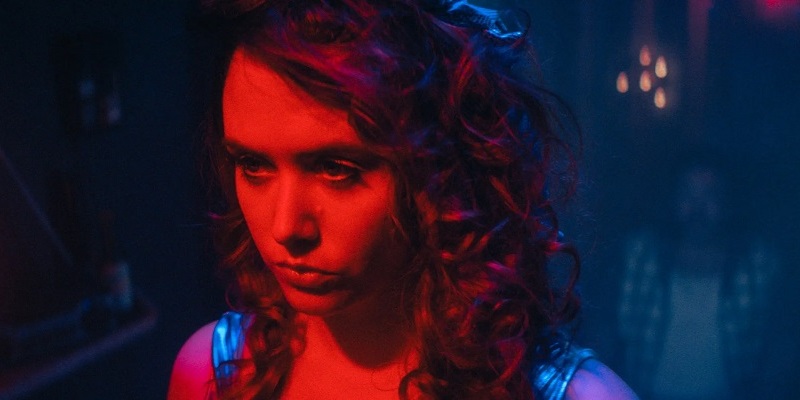
Review by
Eric Hillis
Directed by: Luke Boyce
Starring: Caito Aase, Shaina Schrooten, Bishop Stevens, Buzz Leer, Phil Bogdan, Sammy DelPurgatorio

Reminding us that America's culture wars didn't begin with the election
of Trump, director Luke Boyce's Revealer plays out
its culture clash in 1987. This was the era of the Satanic Panic, a time
when conservative Christians were blaming everything from Heavy Metal to
Dungeons & Dragons for the ills of society. Boyce's film may be set
in the '80s, but its not so subtle dialogue makes it clear it's
addressing issues that continue to divide America. You can't help but
assume the '80s setting exists merely to do away with the storytelling
inconveniences of cellphones and wifi, and perhaps add a bit of neon
sheen.
That neon sheen is provided by the day-glo lighting of Revealers, a
strip joint on the outskirts of Chicago. There we find Angie (Caito Aase), a stripper who begs for an extra shift in a peep show booth to earn
some cash to help take care of her nephew. To get to work Angie has to
run the gauntlet through an angry mob of Christian protesters, including
the young Sally (Shaina Schrooten), who seems to take a personal
interest in trying to save the stripper's soul.

As Angie gets to work grinding her body in the booth, outside all Hell
is breaking loose. Literally. It's the biblical apocalypse, the day of
reckoning, judgement day, all that fire and brimstone stuff made real.
Sally manages to find her way into Revealers and take shelter, only to
find it seems herself and Angie may be the only two people left alive in
Chicago. Can they put their differences aside and work together to find
a way out?
You have to admit Revealer has a cracking premise, one
that should allow for high-concept filmmaking on a low budget. But this
sort of movie relies on the witty interplay between its mismatched
protagonists. The script, by comics writers Tim Seeley and
Michael Moreci, never manages to exploit the potential humour of
its novel setup. We go into Revealer expecting witty
banter between its leads, but instead we find that the film serves as a
crude mouthpiece for a series of stock liberal atheist talking
points.

The effect is akin to a lecture, with Angie constantly berating Sally
over her perceived hypocrisy of Christians. Sally never really gets to
put her point of view across, because the film doesn't want her to. As a
non-believer who has had many a drunken debate with religious folks, I
can tell you they certainly don’t shy away from sticking up for their
beliefs and arguing their case, and nor should they. It's clear from the
start that the movie is taking Angie's side, which is perfectly fine
(it's the same side this writer would take on such matters), but its
one-sided argument becomes so over-bearing that even if, like me, you
agree with everything she says, it all becomes tiresome. I can only
imagine what a Christian viewer might make of the film.
I don’t believe in God and I don’t have a religious bone in my body,
but if I found myself in the middle of an apocalypse where demons from
Hell were literally chasing me in order to steal my soul, I would
probably have to hold my hands up and admit that Christians might have
been onto something after all. Even while all this is going on, Angie
still argues that the Bible is nonsense. Look around girl, there's a big
demon with horns behind you!

Aase and Schrooten display enough chemistry to suggest that had they
been gifted a better script, Revealer could have been a
winning horror-comedy. With the movie essentially confined to one
location and most of the chaos happening offscreen, the weight really
falls on their shoulders, and they deserve better. Ultimately Angie and
Sally are stock stereotypes, the stripper with a heart of gold and the
religious girl who may not be as prim and proper as she makes out. While
we've seen those characters before, we've never quite seen them paired
in a scenario like this, so it really is a shame that
Revealer couldn't make something interesting of this
premise.
Revealer has a message about not judging people, but it's
a hypocritical message, as the filmmakers have clearly judged those
whose views don’t align with their own. What's revealed most of all here
is its anti-religious bias.


